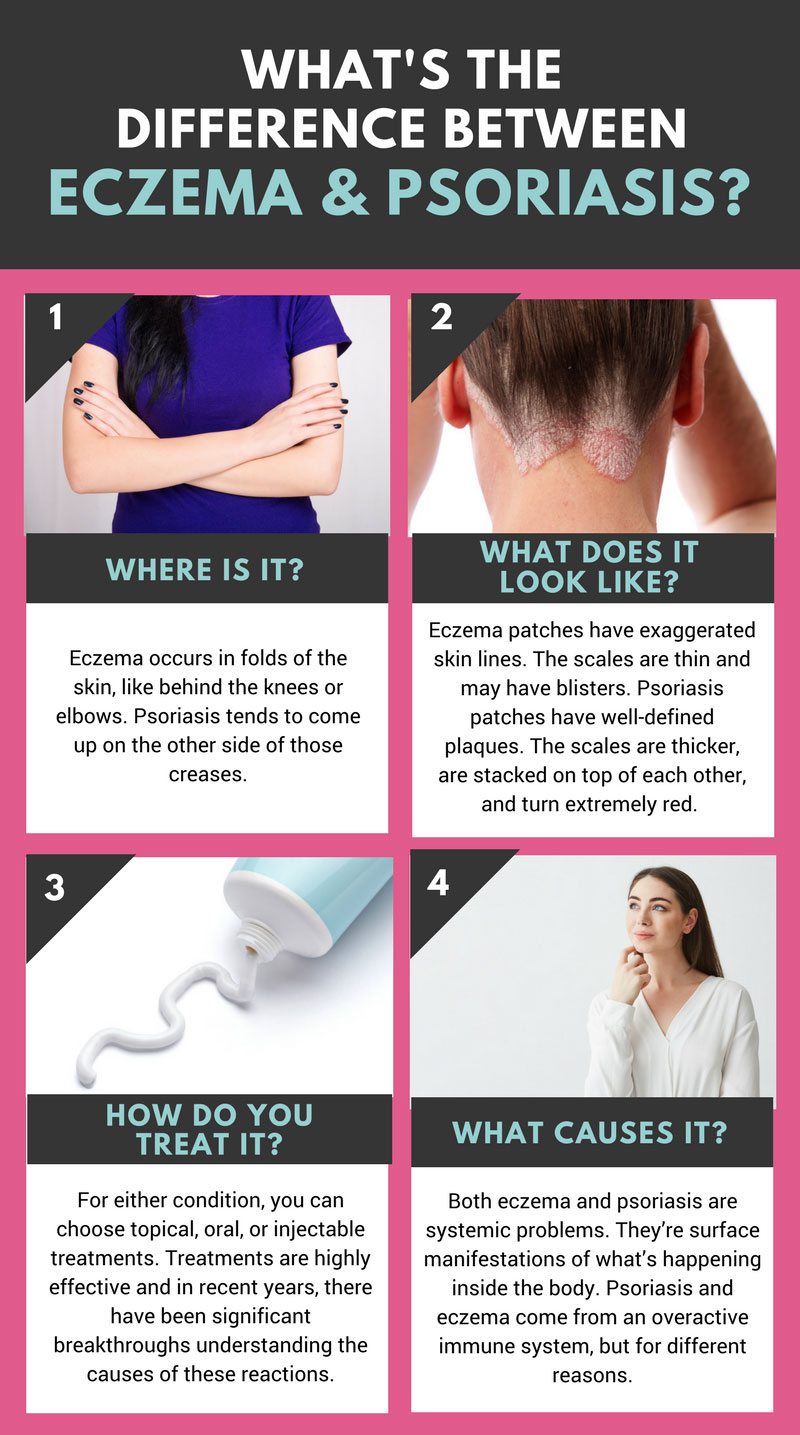Psoriasis or eczema – which one do you have?
One things for sure: either way, you’re dealing with uncomfortable, unsightly, and itchy skin you’re ready to get rid of.
What’s The Difference Between Eczema and Psoriasis?
It can be easy to confuse eczema and psoriasis, but with a little more information about the location of the affected area and what it looks like, you’ll be able to tell the difference. And more importantly, you’ll be able to get started with the right treatment.
Where Is It?
First things first: where is the affected area? The location can often be used to differentiate between the two skin conditions.
Eczema
Eczema occurs in folds of the skin. Think about the skin surfaces that are folded together — that’s where you’ll see eczema. So, if a red, scaly rash pops up behind your knees, elbows, or another creased area, it’s probably eczema.
Psoriasis
Psoriasis tends to come up on the other side of those creases. Often, you’ll see it on the outside of your knees and elbows. You also may notice it in the scalp or on your lower back.
What Does It Look Like?
It’s easy to confuse what they look like. They both have red, scaly plaques. They’re usually more than one centimeter in diameter, and they’re raised from the skin. But there are some key differences too.
Eczema
These patches have exaggerated skin lines. The scales are thin and may have blisters. There’s also more cracking and weeping of the skin on these areas.
Psoriasis
Psoriasis patches have well-defined plaques. The scales are thicker, are stacked on top of each other, and turn extremely red. Occasionally, they’ll crack and bleed.

What Causes These Skin Conditions?
Both eczema and psoriasis are systemic problems. They’re surface manifestations of what’s happening inside the body. Psoriasis and eczema come from an overactive immune system, but for different reasons.
Think of your immune system like a car. With psoriasis, it’s like the gas pedal is stuck and the immune system is giving the body too much fuel. Dealing with eczema is like not having any breaks.
In both situations, inflammation occurs because the immune system is overcompensating.
Related: Understanding Eczema: Causes and Treatments and Psoriasis: Causes, Appearance, and Treatment Options
How Do You Treat Eczema & Psoriasis?
For either condition, you can choose topical, oral, or injectable treatments. Treatments are highly effective. In recent years, there have been significant breakthroughs understanding the causes of these autoimmune reactions. Because of that, we have even more effective new treatment discoveries.
Should You Consult a Dermatologist?
If you suspect you have either condition, contact your dermatologist. They’ll first confirm which condition you have. Then they’ll start you on a treatment plan to clear up those red, itchy scales so you don’t have to worry with them any longer.
For more information, check out our eczema and psoriasis services at Epiphany Dermatology.

Dr. R. Todd Plott is a board-certified dermatologist in Coppell, Keller, and Saginaw, TX. His specialization and professional interests include treating patients suffering with acne, identifying and solving complex skin conditions such as psoriasis, rosacea, atopic dermatitis, and identifying and treating all types of skin cancers. In his spare time, Dr. Plott enjoys cycling, traveling with his wife, and spending time with his children and new grandson.
Learn more about Dr. Plott.

